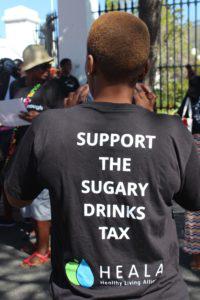Small job losses if sugar content cut – Treasury


Treasury official Warren Harris reported this to parliament yesterday while giving Treasury’s response to the many submissions made on the tax.
The beverage industry has warned of tens of thousands of job losses should the tax be introduced.
Treasury has proposed a 2,1 cent tax per gram of sugar on all sweetened drinks, but the first 4g per 100ml will be exempted as an incentive for producers to reformulate their drinks with less sugar.
It plans for the tax – which it calls a health promotion levy – to come into effect as soon as the Rates Bill becomes law, Treasury Chief Director Mpho Legote said.
MPs in the Finance Committee are currently debating the Rates Bill, and Parliament has held four public hearings on the tax.
Treasury’s socio-economic impact study, which has been presented to Nedlac, projects that a maximum of 7,200 jobs will be lost if the beverage industry does nothing about the sugar content of its drinks.
But if it reduces the sugar content and promotes sugar-free options, there would be relatively few job losses – mostly involving sugar cane growers.
Impact study rejected
However, Cosatu’s Matthew Parks said that both industry and his federation had rejected the impact study at Nedlac as it was “Treasury-driven” and “doesn’t address sugar farms and sugar mills”.
In order to protect sugar sector jobs, Cosatu wants government to increase tariffs on imported sugar, government support to increase sugar exports and for local manufacturers to be compelled to use 100% local sugar in their production (current level is 85%).
“But the long-term future is using sugar for biofuels,” said Parks, adding that Cosatu was pleased that the Department of Trade and Industry had recently become involved in trying to work out ways to mitigate the effects of the tax.
“We don’t think that the health goal is hostile to jobs, as the non-communicable diseases (NCDs) especially affect working class families,” said Parks.
Meanwhile, Melvyn Freeman, Chief Director for NCDs in the Department of Health, warned that government had to urgently address the “very profound impact of NCDs”.
“Unless we stop the NCD numbers, the health system is going to be completely overwhelmed,” warned Freeman.
Author
Republish this article
This work is licensed under a Creative Commons Attribution-NoDerivatives 4.0 International License.
Unless otherwise noted, you can republish our articles for free under a Creative Commons license. Here’s what you need to know:
You have to credit Health-e News. In the byline, we prefer “Author Name, Publication.” At the top of the text of your story, include a line that reads: “This story was originally published by Health-e News.” You must link the word “Health-e News” to the original URL of the story.
You must include all of the links from our story, including our newsletter sign up link.
If you use canonical metadata, please use the Health-e News URL. For more information about canonical metadata, click here.
You can’t edit our material, except to reflect relative changes in time, location and editorial style. (For example, “yesterday” can be changed to “last week”)
You have no rights to sell, license, syndicate, or otherwise represent yourself as the authorized owner of our material to any third parties. This means that you cannot actively publish or submit our work for syndication to third party platforms or apps like Apple News or Google News. Health-e News understands that publishers cannot fully control when certain third parties automatically summarise or crawl content from publishers’ own sites.
You can’t republish our material wholesale, or automatically; you need to select stories to be republished individually.
If you share republished stories on social media, we’d appreciate being tagged in your posts. You can find us on Twitter @HealthENews, Instagram @healthenews, and Facebook Health-e News Service.
You can grab HTML code for our stories easily. Click on the Creative Commons logo on our stories. You’ll find it with the other share buttons.
If you have any other questions, contact info@health-e.org.za.
Small job losses if sugar content cut – Treasury
by kerrycullinan, Health-e News
June 23, 2017



